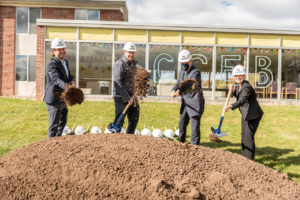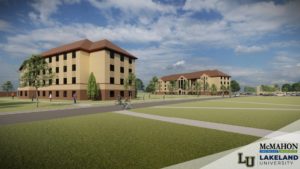 Lakeland University broke ground Thursday, October 15th on the largest single investment in the main campus in the institution’s 158-year history.
Lakeland University broke ground Thursday, October 15th on the largest single investment in the main campus in the institution’s 158-year history.
In April, Lakeland learned it received a $35.4 million fixed-rate low interest loan from the U.S. Department of Agriculture (USDA) Rural Development division. Lakeland will use $26 million to construct two new residence halls to serve freshman and sophomores, a water tower and related infrastructure. The remaining $9.4 million will be used to refinance the university’s existing long-term debt.
The two new, identical residence halls will be located on the area south of the Younger Family Campus Center on the sites currently occupied by decades-old Grosshuesch and Muehlmeier Halls, which will both be demolished in 2021. Lakeland estimates that both of the new halls will be open for the fall of 2022. The two new halls will provide Lakeland with 400 beds, compared to 291 beds available in the halls they will replace – A.M. Krueger, Muehlmeier, Grosshuesch, Friedli and Hofer (the Suites). The Suites will also be demolished. The future of A.M. Krueger is to be determined.
“Our Cooperative Education program is making the difference as Lakeland is constructing two new residence halls when others are boarding them up.”
“Lakeland’s DNA is the same DNA that the farms and farmers in this area have had since the beginning,” said Lakeland President David Black. “The molecule that combines is study and work. They are not two molecules on the same strand … it’s one. It also includes family, justice and hospitality.
Black thanked many while noting that Lakeland Chief Financial Officer Amy Wirtz worked tirelessly to make sure the loan and project planning process stayed on track. Wirtz, in turn, credited Lakeland’s partners in the process, including the USDA, Bank First, McMahon Associates, Inc. and Quarles & Brady.
“In less than two years, this space where we are gathered today will look dramatically different as we make this historic investment in Lakeland and our students,” Wirtz said. “We are thankful to our external partners for the role they played in supporting us, as well as our Board of Trustees and employees who played key roles in making this possible. Our students deserve to live in spaces that will make you proud to be a Muskie.”
Along with the additional, updated housing for students, each hall will provide resident support functions including front desk area, vending, lounge spaces, kitchenettes, study rooms, gender-neutral bathrooms, laundry facilities, recycling centers, bottle-filling station and more. Each building will also have a basement to provide resident storage space and unfinished square footage for the ability to build out additional resident program space in the future.
USDA is funding this project through the Community Facilities Direct Loan and Grant Program. Investments can be used to build or upgrade schools, libraries, clinics and public safety facilities. More than 100 types of projects are eligible for Community Facilities funding. Projects must be in rural areas with a population of 20,000 or less.

